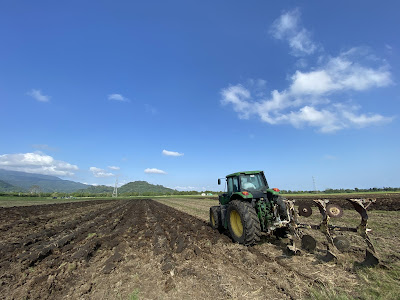Under “Precision Direct-Seeded Rice-based Diversification Systems for Transforming Labour Requirement, Yields and Profitability of Smallholder Farmers in Odisha” (IRRI-GoO-DSR-Odisha Project), a 5-day interstate exposure visit of lead farmers and potential Service Providers (SPs) from Odisha was organized from 3-7 August 2022. This project is supported by the Government of Odisha and is being implemented by IRRI in close coordination with the Department of Agriculture and Farmers Empowerment (DAFE), Government of Odisha. A total of 25 participants representing 3 lead farmers and 2-DSR- SPs each from Bargarh, Ganjam, Kalahandi Mayurbhanj and Puri districts of Odisha were involved in the event.
The main objective of this event was to provide an exposure on cluster demonstrations and scaling pathways for Mechanized DSR at landscape level. Farmers were exposed to cluster demonstrations of more than 2200-2400 ha at different sites in Bapatla district. Live demonstrations on application of pre-seeding herbicides, field preparation for Dry-DSR, soil mulching, basal phosphatic fertilizer application, drill seeding followed by planking, spray of pre-emergence herbicides and mechanical weeding were also organized. These field operations and cluster demonstrations along with organizing live demonstrations and different site visits were mainly facilitated by Bapatla-based NGO Praanadhaara Organized Agro-forestry Private Ltd. Praanadhaara has been extensively working on mechanized rice farming services and is the main catalyst for the wide-spread adoption of mechanized DSR in these regions from last more than ten years. During kharif 2022, the area under mechanized dry-DSR is around >20000 ha in Bapatla and Guntur districts of AP, which clearly reflects an extraordinary progress of the technology over the years.
“This exposure visit was a learning tour for us, the service provision model of Praanadhaara is very organized and we will also start such a program at small scale,” said Sh. Asit Satapaty, farmer from Mayurbhanj district of Odisha.
On the visit, Sh. K. Pundarikashudu, Director of Praanadhaara and Coordinator for Mechanization DSR Initiatives shared plans to standardize mechanized operations of DSR starting from field preparations, fertilizer application, drill seeding, application of herbicide and other pesticide, in-season application of urea etc. Through dry-DSR, the said group is instrumental in saving around INR 3.0 Cr per kharif season by covering around 6000 acres at village Cheru Jamunapalam (as the net saving is around INR 5000/acre). He expressed his happiness and gratitude for IRRI’s encouraging initiatives to organize the exposure visit of Odisha farmers in Bapatla and adjoining Guntur district.
“I am highly impressed and very much convinced with the impacts of Praanadhaara’s efforts in upscaling DSR at such a wider scale. Participants must have benefited a lot and these learning will help us for faster and wider adoption of DSR in Odisha. We look forward to working more closely with similar organizations,” said Dr. Ashok Yadav, Coordinator IRRI-GoO-DSR-Odisha and CSISA Project.
”The group had also visited COAE of Acharya N.G. Ranga Agricultural university village Lam of at Bapatla district, AP to explore featured farm machinery and implements. Thereafter, a live demonstration on 25 acres was organized on wet DSR at village Nidubrolu in Guntur district. It covered pre-seeding herbicide application, mechanized bund making, wet tillage for field preparation, furrow making and seeding with refined machine. This piece of land has been voluntarily offered for such initiatives by Mr. Kishore, who also works for the welfare of native farmers in Guntur district. An interaction was also organized between Odisha and AP farmers at the house of Acharya N. G. Ranga, village Nidubrolu. On both days, there were a large number of prominent farmers and other stakeholders including Appa Rao, Vijay, Suresh, Shantnu Mohapatra, Sworup Behura, Sanjay and Jai Sridhar along with IIRI and IRRI teams.
“For addressing the key challenges and wide-spread adoption of mechanized DSR, IRRI looks forward to joining hands with Praanadhaara, where cross-learning can benefit the stakeholders in India as well as in other South Asian countries,” Dr. Virender Kumar, Deputy Platform Lead and Global Coordinator, Direct-Seeded Rice Consortium (DSRC), concludes.
###


No comments:
Post a Comment